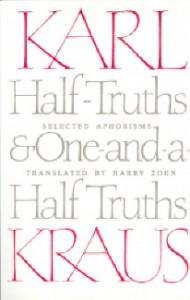 Before Jonathan Franzen lent his literary celebrity to the resurrection of his reputation, Karl Kraus was widely unread (to use a Krausian construction) in the English-speaking world. The Austrian playwright, essayist and critic is notoriously difficult to translate – so much of his wit residing in puns and so many of his best writings occasioned by political and social events obscure to modern readers – but as a satirist he has gained notoriety, largely thanks to his aphorisms. For his acerbic wit and relentless criticism of Austrian society – the wealthy and the poor, men and women, writers and readers – his contemporaries dubbed him the Great Hater.
Before Jonathan Franzen lent his literary celebrity to the resurrection of his reputation, Karl Kraus was widely unread (to use a Krausian construction) in the English-speaking world. The Austrian playwright, essayist and critic is notoriously difficult to translate – so much of his wit residing in puns and so many of his best writings occasioned by political and social events obscure to modern readers – but as a satirist he has gained notoriety, largely thanks to his aphorisms. For his acerbic wit and relentless criticism of Austrian society – the wealthy and the poor, men and women, writers and readers – his contemporaries dubbed him the Great Hater.
Kraus founded his own paper, Die Fackel (The Torch), and, much like Samuel Johnson with The Rambler, he became its principle contributor, editor and publisher for nearly forty years. Oscar Wilde made occasional guest contributions, as did many of Germany’s prominent intellectuals, and Kafka was among the paper’s readership. Most of his output for The Torch consisted of social and political commentary, but eventually he began to publish aphorisms, and it is from these writings that my volume has drawn. With the caveat that attempting to glean something of Kraus’ character from his aphorisms is a fool’s errand, it would be safe at least to say that he despises journalists (“The making of a journalist: no ideas and the ability to express them” or “It is the mission of the press to disseminate intellect and at the same time destroy receptivity to it”), psychoanalysis (“Psychoanalysis is that mental illness for which it regards itself as therapy” and “So-called psychoanalysis is the occupation of lustful rationalists who trace everything in the world to sexual causes – with the exception of their own occupation”) and religious legislation of sexual mores (“Christianity has enriched the erotic meal with the appetizer of curiosity and spoiled it with the dessert of remorse”).
Kraus died three years before the start of World War II but lived long enough to witness Hitler’s rise to power, and my favorite aphorisms take on a special poignancy in this context: “How is the world ruled and led to war? Diplomats lie to journalists and believe these lies when they see them in print” or “The secret of the demagogue is to appear as dumb as his audience so that these people can believe themselves as smart as he.” These aphorisms are merely Kraus-lite, an appetizer to the main course of his denser and more specific, more esoteric fiction, but the better part of a century has not dulled or dated them. The intensity of Kraus’ feeling lives on.